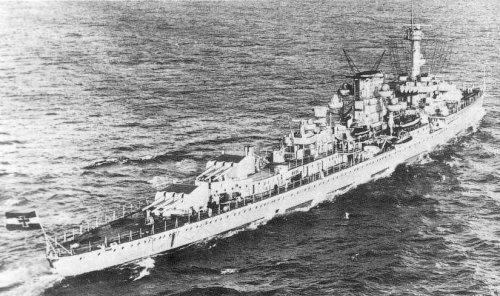

Leipzig 1939
| Name | No | Yard No | Builder | Laid down | Launched | Comp | Fate |
| Leipzig | 117 | KMW Wilhelmshaven | 28.4.1928 | 18.10.1929 | 8.10.1931 | damaged 15.10.1944, repair incomplete |
|
Displacement standard, t |
6310 |
|
Displacement full, t |
8100 |
|
Length, m |
168.8 wl 177.1 oa |
|
Breadth, m |
16.3 |
|
Draught, m |
4.88 mean 5.69 max |
|
No of shafts |
3 |
|
Machinery |
CODAS: 2 Germania geared steam turbines, 8 Marine boilers (2 shafts) + 4 MAN 2-stroke 7-cylinder double action diesels (1 shaft) |
|
Power, h. p. |
60000+12400=72400 |
|
Max speed, kts |
31+18=32 |
|
Fuel, t |
oil 1183, diesl oil 348 |
| Endurance, nm(kts) | 2800(16.5) under turbines + 3900(10) under diesels |
|
Armour, mm |
belt: 50 - 20, bulkheads: 70, deck: 25 - 20, turrets: 30 - 20, CT: 100 - 30 |
|
Armament |
3 x 3 - 149/57 SK C/25, 2 x 1 - 88/45 SK C/13, 4 x 3 - 500 TT, 120 mines |
|
Complement |
850 |
Project history: Leipzig ("cruiser Å", or "Ersatz Amazone") was development of "K" class, differing, first of all, by propulsive plant construction. Ship had three shafts, 4 MAN diesels with 3150hp power each worked on central shaft, ensuring 18-19kts speed. Boiler uptakes were deduced to single funnel, small funnel near superfiring aft turret has been intended for diesels. Hull structure have strengthened, have applied bulges covering an armoured belt, and a bulbous bow. The belt raked 18° outside had 50mm thickness amidships, 20mms in fore and 35mm in an aft ends. The armour deck in centreline area was flat, and to sides was rounded in the arc form and connected to belt lower edge, and its thickness in this part have increased from 20 to 25mm. Armoured citadel protected about 70% of a hull length. Armament structure have left without changes, but aft turrets have transferred to centreline.
Ship protection: 18°-inclined inner 50mm belt extended between end turrets and closed by 70mm bulkheads fwd from fore and aft from aft turrets. Fore ship end was protected by 20mm belt, aft end by 35mm. Belt was connected with 15mm anti-torpedo longitudinal bulkhead by 10mm slope. 20mm flat main deck placed on upper belts edge level and was connected with lower edge of the belt by 25mm thick curved outer parts. Turrets had 30mm faces and 20mm sides, rears and roofs. Shell hoists had 30mm armor. CT had 100-50mm sides, 50mm roof and 50mm communication tube. There was 20mm fore bulkhead.
Modernizations: 1934: - 4 x 3 - 500 TT; + 2 x 1 - 88/45 SK C/13, 4 x 2 - 37/80 SK C/30, 4 x 1 - 20/65 C/30, 4 x 3 - 533 TT
1936: - 4 x 1 - 88/45; + 3 x 2 - 88/72 SK C/32, 1 catapult, 2 seaplanes (He 60)
(2/1940 - 12.1940): 2 boilers were removed, maximal speed felt to 24kts; - 1 catapult with seaplanes
early 1941: - 4 x 1 - 20/65, 2 x 3 - 533 TT; + 2 x 4 - 20/65 C/38, 4 x 1 - 20/65 C/38
Summer 1943: + FuMO 22 radar, FuMB 4 Sumatra, FuMB 6 Palau ECM suites
early 1944: - 2 x 3 - 533 TT
mid-1944: - 4 x 2 - 37/80, 2 x 4 - 20/65, 4 x 1 - 20/65; + 4 x 1 - 40/56 FlaK 28, 8 x 2 - 20/65 C/38
Naval service: Leipzig 13.12.1939 was torpedoed by British submarines Salmon and Ursula. She was never completely repaired and commissioned again as training ship (4 boilers were demounted, max speed decreased to 24kts); 15.10.1944 she was hard damaged as a result of collision with heavy cruiser Prinz Eugen, repair was incomplete till end of war; she was scuttled by Allies in Skagerrack 11.7.1946 being loaded with chemical amunition.

Leipzig 1934
© Ivan Gogin, 2008-14